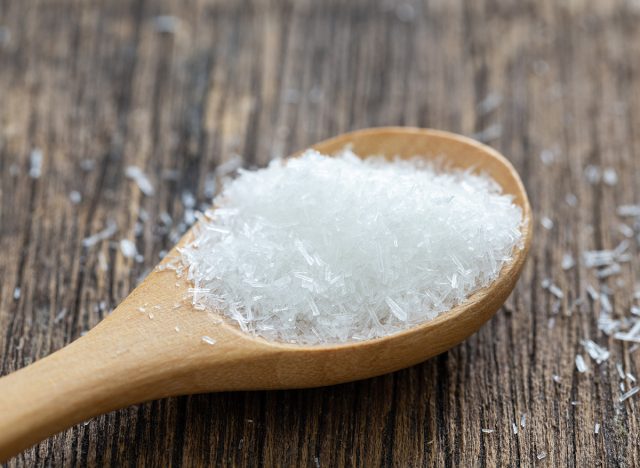For decades, monosodium glutamate (MSG) has been the kind of ingredient you might hear uttered in the same breath as "artificial flavors" or "trans fats"—as in, a food fraught with controversy. Four in 10 Americans reported actively avoiding it as of 2018.
Even among nutrition professionals, there's no complete consensus about the safety of this additive. Case in point: A recent email ad sponsored by MSG manufacturer Ajinomoto was sent to Academy of Nutrition and Dietetics members, recommending they encourage their clients to use MSG as a salt substitute. This recommendation (and the lack of disclosure of who sponsored it) led to pushback from some nutrition professionals.
And yet, an increasing number of nutrition experts have called for stripping away the stigma around MSG. Many say that avoidance of it is rooted in outdated info (and possibly even anti-Asian racism).
So is this additive a dietary no-no or an a-OK flavor enhancer? Here's what you need to know.
The history of MSG's bad rap

A little backstory sheds light on MSG's unsavory reputation. It all started in 1968, when a letter appeared in the New England Journal of Medicine, purportedly from a Dr. Robert Ho Man Kwok, expressing concern that Chinese food had made him sick. He contended that the monosodium glutamate in Chinese food was responsible for symptoms like headache, dizziness, numbness, and weakness. (It was later revealed that the letter was, in fact, written by an imposter as a prank.)
At the time, however, researchers took the concept and ran with it. A 1969 study on mice determined that rodents fed high amounts of MSG developed brain lesions, obesity, and endocrine disruption. Further studies made claims that the additive could cause problems in the heart and liver, as well as behavioral changes and even tumors. As these alarming ideas made their way to the public, MSG developed a reputation as an ingredient to avoid at all costs.
More accurate MSG research
In reality, much of the early research on MSG had significant flaws. According to a 2020 study, most research that showed its supposedly harmful effects was fraught with poor design and small sample size. Many studies also gave subjects extremely high amounts of MSG you'd never find in a normal diet.
More current research tells a different (and much more positive) story. For example, you may be surprised to learn that the Food and Drug Administration (FDA) has placed MSG in their "GRAS" category—aka "generally recognized as safe"—for years now. According to the FDA, science hasn't been able to consistently trigger any adverse symptoms from MSG consumption. The really interesting part: this holds true even in people who claim to have an MSG sensitivity.
In terms of specific reactions to MSG, the good news continues. A 2016 systematic review in the Journal of Headache Pain found no correlation between eating foods high in MSG and developing headaches. You can rest easy about MSG's effects on your brain, too. Despite some scary-sounding claims that this ingredient could cause the death of your brain cells, scientific evidence shows that MSG doesn't cross the blood-brain barrier. The take-home message: it's extremely unlikely that a plate of beef and broccoli will disrupt your neurological function.
As for weight gain (another common MSG concern), the research isn't perfectly clear-cut. According to a 2019 review, some studies have reported that high-MSG foods could increase hunger and even promote obesity, while others have shown the opposite effect. The deciding factor of whether MSG makes you fuller or hungrier may be the macronutrient content of a meal.
What about MSG sensitivity?
MSG is considered safe for the vast majority of the population, but as with any food, it's possible to have a sensitivity to it. Less than 1% of the general population is thought to have MSG sensitivity. For these people, eating large amounts could result in unpleasant symptoms like dizziness, headache, trouble breathing, or numbness. If you consistently experience symptoms like these after eating high-MSG foods, you may want to scale back on them. Not sure if MSG is causing your issues? A food journal can be a helpful tool for finding answers.
That said, you're likely already eating foods with MSG without even realizing it! Numerous whole foods like tomatoes, mushrooms, and aged cheeses naturally contain monosodium glutamate—and the body doesn't distinguish between natural and synthetic forms. Whether it comes from a fresh tomato or a bowl of ramen, your GI tract breaks down sodium and glutamate in the same way.
The potential positives of MSG
Ready to flip the script about MSG? Not only is this long-maligned ingredient not problematic for most people, but it could also actually have a positive impact on your diet. Because of its savory umami flavor, MSG could be a flavorful alternative to salt. (It contains just one-third the sodium of table salt.) A 2017 study in the journal Food Science and Nutrition found that, in both processed and homemade foods, MSG could reduce sodium without affecting the perception of saltiness.
With all the evidence for its safety—and since so many of us tend to overdo it with the saltshaker—there's plenty of reason to give MSG another chance.
No comments:
Post a Comment